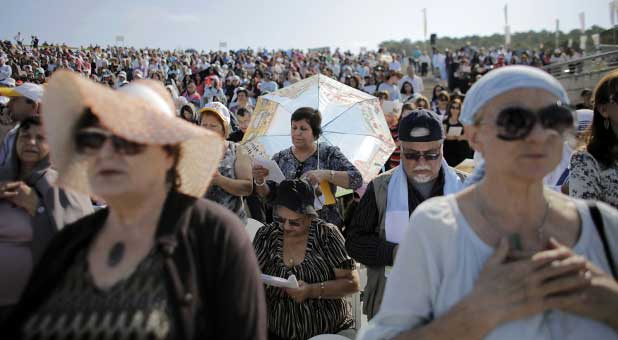I was interested to read an article recently in the Jerusalem Post opposing the construction of a 100-foot statue of Jesus in Nazareth. I am neither a reverend nor a rabbi, but even as an Orthodox Israeli Jew, I differ with this view.
I am not as familiar with the Gospels as the writer and was interested in the notion (with references from John and Mark) that Jesus “refused power and condemned the desecration of the Temple for commercial purposes” in what seemed to show a great sense of humility. However, I also know that the miracles with which Jesus is credited were not done alone, and it seems very much that he did not shy away from his public persona. So maybe a statue proclaiming his ministry is exactly what he’d want.
While acknowledging that the thesis “all architecture is political” that’s central to this argument is “unrelated,” the writer nevertheless relates examples that make his case, specifically highlighting examples in Israel over the centuries. Yet there are other architectural cases that lay the foundation for exactly the phenomena today of Christians in Israel asserting their rights (the only place in the Middle East in which they are free to do so), and even Christian Israeli Arabs actively affirming their loyalty to Israel, which are related.
Some examples that are overlooked paint a very different picture. One is the case that went to the Israeli courts of Muslims in Nazareth seeking to build a mosque next to the Church of the Basilica, taller than the church, as if to assert Islamic domination over Christianity.
That issue was settled in the Israeli courts, but a decades-long concerted effort to drive out local Christians, and out-populate the rest, still festers. Some of my Christian Israeli Arab friends have shown me and other guests how this is clear. A variation of the “architecture as politics” formula pervades, but rather than building things, Muslims drive out Christians, taking over their properties as squatters, to erase the presence of Christians and Christianity from Galilee.
Even if only 50 percent of what I have seen is accurate, the situation is grave. It’s not only fair but also proper for Christians to assert themselves, and to do so with the support of Jews and the state of Israel. After all, it’s the same strain of Islam driving out Christians from the birthplace of Christianity as that which denies the very existence of the temple and any Jewish connection to the land of Israel.
These are facts on the ground to which the writer alludes as being a catalyst for the construction of the Jesus statue to begin with. Building a 100-foot statue of Jesus is not mutually exclusive to anyone or to his idea that Christians ought to be “peacemakers rather than engage in interfaith competition and triumphalism.”
Affirming the rights of Christians to build a statue of Jesus does not take away from the rights of others to live and worship with full freedom according to their tradition, just as all Israelis do. Where any rights may conflict, we have courts for that. Citing the Jesus statue and Solomon’s and Herod’s temples as being merely political is an affront. Indeed, to be able to build things that sanctify God according to one’s tradition and that do not impose it on or take away from another’s is perfectly appropriate.
Rather than making the proposed Jesus statue political, regardless of what its leading Christian Arab proponent may have said as being part of the catalyst, building a 100-foot Jesus statue in Nazareth, the place where Jesus spent most of his life, should be looked at as a celebration of the birthplace of Christianity, and an affirmation of that.
That today’s Nazareth is 70 percent Muslim is irrelevant. A statue of Jesus would not diminish their ability to live and practice as Muslims, unless of course they deny the reality of Judaism and Christianity being central to Israel, in fact having more roots here than Islam itself. Should Christians diminish their public presence because they are a minority or embrace it and celebrate it to preserve and celebrate their identity?
If all architecture is political, then let’s look at the prevalence of Jewish museums and memorials around the world, commemorating Jewish history and explaining Jewish tradition in places where Jews may have once thrived during 2,000 years of our dispersion but where there are today a relative handful of Jews, if any. Some are memorials in places where Jews were slaughtered. I’m hard pressed to imagine that those behind these places sought to express Jewish triumphalism over anyone or anything.
While there is something perverse in paying to go see the places in which Jews may have once lived or were slaughtered and discriminated against over the centuries, even though these places have little, if any, religious or historical significance other than Jews may have once lived there, does the lack of Jews today mean that these places shouldn’t exist?
Several friends, many of them pastors, shared with me their feeling and appreciation that while I am right, that Christians should have the opportunity to celebrate their faith in Israel as they like as long as it doesn’t infringe on others, for many, a statue of Jesus or any other physical depiction is not their thing. In fact, it runs against the grain of their beliefs. Regarding being a minority among Muslims, one observed that even Islam holds that Jesus was a prophet, and therefore celebration of Jesus need not be mutually exclusive to Muslims.
Another wrote that, as an observant Jew, Jesus well knew prohibitions of graven images in the Second Commandment and that this is something he would not have wanted. That’s an excellent point and one, had it been presented as a reason why not to build such a statue, would make abundant sense.
Another argument against construction of a 100-foot Jesus statue is that it is commercializing Jesus, like a similar statue in Rio. Having visited Rio, it’s hard to imagine that the huge statue of Jesus there would attract many more people than are already going for the beaches, culture and nightlife anyway. Yet it certainly may be a tourist attraction for those who are already there. Nor would such a statue suddenly be the magnet drawing Christians to visit Israel.
If I’m wrong and millions flock to Israel to see a 100-foot statue of Jesus, attracting Christian pilgrims from around the world, connecting them with the land and people of Israel and the roots of their faith, infusing money into the local economy and supporting local Christians rather than looking from afar and bemoaning Christians becoming an endangered species in the Middle East, is that a bad thing?
One might even suggest it’d be a little miraculous.
Jonathan Feldstein is the director of Heart to Heart, a unique virtual blood donation program to bless Israel and save lives in Israel. Born and educated in the U.S., Feldstein emigrated to Israel in 2004. He is married and the father of six. Throughout his life and career, he has been blessed by the calling to fellowship with Christian supporters of Israel and shares experiences of living as an Orthodox Jew in Israel. He writes a column for Charisma’s Standing With Israel. You can contact Jonathan at [email protected].
See an error in this article?
To contact us or to submit an article






















